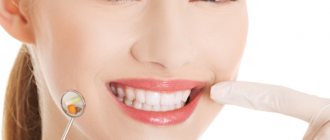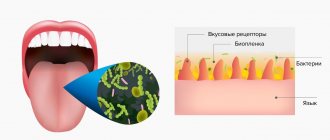Causes of bad breath
Halitosis occurs when the exhaled air contains volatile compounds with an unpleasant odor. Their sources can be 1,2,3,4,6:
- some food products (garlic, onions, cabbage);
- products of carbohydrate fermentation (fermentation);
- decaying food debris;
- waste products of bacteria.
However, the main cause of bad breath is the production of hydrogen sulfide by anaerobic bacteria in the mouth. Their peculiarity is their ability to live without oxygen and in places that are difficult to reach with a toothbrush, for example, on the back surface of the tongue and the back wall of the pharynx, between the teeth, in gum pockets, on the tonsils, in the natural grooves of the teeth1,2,3.
to come back to the beginning
Risk factors
Factors that promote the growth of oral bacteria can cause halitosis. They are conventionally divided into local and general1.
In 80-90% of cases, halitosis is found to be caused by one of the following reasons1,2,3,4,6:
- caries and its complications;
- inflammation in the periodontium;
- diseases of the oral mucosa;
- poor hygiene, especially poor cleaning of teeth, tongue, orthopedic and orthodontic devices (prostheses or braces) - neglect of oral care leads to the accumulation of food debris, which is food for microbes, between the teeth, near the gums, on the back of the tongue, on the elements of the device ;
- deficiency of saliva with xerostomia or “dry mouth syndrome” - with a decrease in salivation, the natural cleansing of the oral cavity is disrupted and favorable conditions are created for the proliferation of microbes.
If local causes of halitosis are associated with the oral cavity, then general ones are associated with the condition of the whole organism1,2. But indirectly, general factors can influence oral health by promoting mucosal dryness and bacterial growth1,2.
Thus, the following factors can contribute to the proliferation of bacteria and the appearance of bad breath:
- Nutritional features. Eating large amounts of protein (meat, fish), coffee, carbonated drinks (sweetened with sweeteners) and alcohol promotes the growth of bacteria that produce “fragrant” volatile compounds1,2,3.
- Smoking. Although nicotine and tobacco combustion products have an unpleasant odor, this is not the only cause of halitosis in smokers. Due to smoking, the oral mucosa becomes dry, the number of bacteria on it increases, and inflammatory processes in the periodontium may occur1,2,3. All this contributes to the appearance of bad breath.
- Hormonal changes. Women may experience bad breath during menstruation. “Menstrual breathing” occurs due to fluctuations in the level of hormones that affect the properties of saliva, making it more viscous2. In addition, stress hormones can influence the growth of oral bacteria that produce volatile compounds2.
- Some medications , such as antibiotics and hormones (glucocorticosteroids), reduce saliva production, which promotes the growth of anaerobic bacteria3.
to come back to the beginning
Causes of halitosis
- poor quality daily brushing of teeth and gums;
- the presence of plaque on the teeth, lack of hygienic brushing of teeth for a long time;
- chronic ENT diseases;
- development of caries;
- gum disease;
- human speech activity;
- imperfect tongue cleaning;
- eating spicy foods;
- diseases of internal organs and systemic pathologies (diabetes, gastrointestinal disorders);
- stressful conditions;
- alcohol consumption;
- caffeine abuse;
- use of strong medications;
- incorrect prosthetics, against the background of which pathogenic bacteria accumulate under prosthetic structures.
Halitosis is called a speaker's disease. People whose profession involves continuous speech activity and who have dental problems are very often diagnosed with halitosis.
How does halitosis manifest?
Constant bad breath is one of the symptoms of periodontal disease2. With physiological halitosis, when there are no dental or general diseases, the unpleasant odor is a temporary phenomenon. It appears after eating specific foods (onions, garlic) and disappears some time after eating and brushing teeth6. If you notice bad breath in the morning or after intense physical activity, it is likely that you are not producing enough saliva or it is drying up quickly due to breathing through your mouth at night or during exercise6.
to come back to the beginning
Treatment
Often a person tries to get rid of bad breath on his own - using refreshing sprays or chewing gum. But this approach does not eliminate the causes and acts temporarily - complete disappearance of the unpleasant odor can only be achieved under the supervision of a doctor, who will determine the causes and select individual treatment2,5.
If halitosis is confirmed by tests performed by a doctor, it is considered true. But sometimes a person is sure that his breath is bad, although those around him do not smell anything. Doctors refer to this condition as false halitosis or pseudohalitosis1,3.
As a rule, people with bad breath should first consult a dentist1. For physiological halitosis, proper oral care is taught, including brushing the teeth and tongue1,4,6. If the problem of bad breath lies in dental diseases, then the doctor1.6:
— carries out professional hygiene — removes dental plaque;
- eliminates foci of infection - treats or removes decayed teeth, cleans periodontal pockets;
— prescribes therapy aimed at restoring saliva deficiency;
— in case of inflammatory processes, prescribes drug treatment.
to come back to the beginning
Bad breath - impairs understanding
Smells play, perhaps, one of the most important roles in our lives, which is very difficult to overestimate - under the influence of one or another smell, many likes and dislikes arise, although often we don’t even think about it. Bad breath (halitosis or halitosis) can thoroughly ruin a person’s life: they won’t hire him, they won’t want to continue getting to know him, work colleagues will try to turn away or move further away during a conversation... Unfortunately, most people are not even aware of the staleness of your breath - a person gets used to his own smell, gets used to it and cannot form an objective opinion about it. Only a few people can make a sensitive request to “test” their own breathing to a friend or loved one. If you suspect that your own breath is “stale”, you can try to do it yourself: take a small cotton swab, apply it to the middle part of your tongue and slightly moisten it. After this, the cotton roll can be assessed for the presence of an unpleasant odor.
Metrogyl Denta® for inflammatory diseases of the oral cavity accompanied by halitosis
Since one of the causes of bad breath is inflammatory periodontal diseases2, one of the directions of therapy should be the treatment of inflammatory diseases of the oral cavity.
Dental gel Metrogyl Denta® is a drug that can be used for the treatment and prevention of most infectious and inflammatory diseases of the oral cavity, in particular gingivitis and periodontitis7. It contains two active antimicrobial components - the antibiotic metronidazole and the antiseptic chlorhexidine, which are effective against the main anaerobic bacteria that cause periodontal diseases7.
to come back to the beginning
How is halitosis treated?
Dental treatment of halitosis involves:
- sanitization of the oral cavity (treatment of caries, removal of severely damaged teeth);
- removal of soft and hard plaque;
- removal of prosthetic systems (if any);
- gum treatment;
- taking antibacterial drugs;
- treatment of the oral cavity with antibacterial compounds;
- the use of special compositions that help neutralize odor (for example, bicarbonate soda solution, compositions with the addition of zinc, etc.). Such compositions release free oxygen, which prevents the proliferation of anaerobic bacteria.
The doctor recommends that the patient give up bad habits, adjust his diet, eliminating large amounts of protein foods, spices, marinades, etc.
And, of course, the main guarantee of successful treatment is the elimination of the root cause of halitosis, be it diseases of the teeth, soft tissues or internal organs.
Prevention methods
To avoid the occurrence of halitosis, it is recommended6:
- Reduce the amount of dental plaque. It is important to promptly clean teeth, dorsum of tongue, dentures and braces from bacteria and accumulated food. To do this, you need to use not only a toothbrush, but also dental floss, brushes and mouthwash.
- Balance your diet - limit your intake of carbohydrates (sweets), which oral bacteria use as nutrients.
- Fight bad habits - limit the number of cigarettes you smoke or give up smoking completely, drink less coffee and alcoholic beverages.
- Increase your fluid intake - this makes saliva production easier.
Bad breath should not lead to problems in communication, especially since it is not difficult to deal with. Professional teeth cleaning, treatment of periodontal diseases and careful personal oral hygiene help get rid of halitosis in 80.7% of patients. Therefore, the right decision would be to make an appointment with the dentist as soon as you notice bad breath. If symptoms persist after eliminating dental causes, you should seek help from a therapist1,5,6.
What is halitosis?
Approved by the Faculty of Columbia University College of Dentistry
What it is? One of the common dental problems is bad breath. It is also known as halitosis. This odor may occur intermittently or may be persistent, depending on its cause.
Millions of bacteria live in the oral cavity, including on the back of the tongue. For many people, they are the main source of bad breath. Consistent temperature and humidity in the mouth are ideal for the growth of these bacteria. In most cases, bad breath is caused by bacteria living in the oral cavity.
Some types of bad breath are considered generally normal. They are not usually considered health problems. One example is morning breath. It is associated with changes in the oral cavity during sleep. During the day, saliva washes away decaying food particles and eliminates odors. At night, the body produces less saliva. Your mouth dries out and dead cells accumulate on your tongue and inner cheeks. Bacteria that use these cells as a food source produce an unpleasant odor.
In addition, bad breath can be caused by the following reasons:
• Poor oral hygiene – Irregular or improper brushing or flossing causes food particles to become trapped between the teeth and disintegrate in the mouth. Poor oral hygiene usually leads to the development of periodontitis (gum disease), which also leads to bad breath.
• Infections in the mouth – these may be due to a cavity in the tooth or periodontitis (gum disease).
• Respiratory tract infections – infections of the larynx, sinuses or lungs.
• External source - eating garlic, onions, or coffee, smoking cigarettes, chewing tobacco. Smoking and drinking coffee, tea and/or red wine can also cause teeth discoloration.
• Dry mouth (xerostomia) – this may be due to salivary gland disorders, medications, or mouth breathing. A large number of prescription and over-the-counter medications can cause dry mouth.
• Diseases – diabetes, liver disease, kidney disease, lung disease, sinusitis, reflux disease and others.
• Psychiatric illness – some people may believe they have bad breath, but others may not notice it. This is called "pseudohalitosis".
Symptoms
You may not be aware that you have bad breath. This is because the olfactory cells in the nose become accustomed to the smell. People around you may notice the smell and move away when you speak, or even express displeasure through facial expressions.
Other symptoms depend on the underlying cause of bad breath:
Oral infections – symptoms vary depending on the type of infection. These may include: • Red or swollen gums, with possible slight bleeding, especially after brushing or flossing • Pus between teeth or a collection of pus (abscess) at the base of a tooth • Loss of teeth or changes in the fit of dentures • Painful open sores or sores on the tongue or gums
Respiratory tract infections – symptoms may include: • Sore throat, red and/or swollen tonsils • Enlarged cervical lymph nodes • Fever • Stuffy nose • Greenish or yellowish nasal discharge • Cough with phlegm
Dry mouth – symptoms may include: • Difficulty swallowing dry foods • Difficulty talking for long periods due to dry mouth • Burning mouth • Unusually high number of cavities • Sjögren's syndrome
Diseases – symptoms of diabetes, lung disease, kidney disease or liver disease.
Diagnostics
Your dentist or therapist may look for bad breath during your appointment. Sometimes a patient's odor can indicate the likely cause of the problem. For example, a “fruity” smell may be a sign of uncontrolled diabetes. A urine-like odor, especially from a person at increased risk of kidney disease, can sometimes indicate kidney failure.
The dentist will review your medical history to determine medical conditions that may cause bad breath and medications that may cause dry mouth. The dentist will also ask you about your diet, personal habits (smoking, chewing tobacco) and any symptoms. He will also ask who noticed the bad breath and when.
The dentist will examine your teeth, gums, mouth, and salivary glands. He will also palpate your head and neck and evaluate your breathing as you exhale from your nose and mouth.
If the most likely cause is medical condition, your dentist may refer you to a GP. In severe cases of gum disease, your dentist may recommend seeing a periodontist (a dentist who specializes in gum problems).
If your doctor suspects you have a lung infection, diabetes, kidney disease, liver disease, or Sjögren's syndrome, you will need diagnostic tests. The type of tests depends on the suspected disease. You may be required to have blood tests, urine tests, chest x-rays or sinus x-rays, or other tests.
Estimated duration
The duration of elimination of bad breath depends on its cause. For example, if the problem is poor oral hygiene, proper dental care will immediately provide fresh breath. After a few days of regular brushing and flossing, even better results will be achieved. Periodontitis and tooth abscess also respond quickly to proper dental treatment. Bad breath associated with chronic sinusitis may return, especially if it is caused by a structural problem in the sinuses.
Bad breath caused by the disease can persist for quite a long time. It often resolves with proper treatment of the underlying condition.
Prevention
Prevention of bad breath caused by dental problems is easily achieved through proper home and professional care.
• Brush your teeth, tongue and gums after meals and floss once a day. This is the most important thing if bad breath is caused by dental problems
• If recommended by your dentist, rinse with a mouthwash approved by your local dental association.
• Visit your dentist regularly (at least twice a year) for examinations and professional oral hygiene.
To combat bad breath, you can also drink plenty of water throughout the day to help your body produce saliva. Periodically rinsing your mouth with water helps remove food particles. Chewing sugar-free gum or sugar-free breath mints can help keep your breath fresh and prevent plaque buildup. However, be aware that consuming sugar-free gum and/or candies that contain sorbitol may have side effects. These include diarrhea and flatulence.
Treatment Treatment for bad breath depends on the cause.
When to see a specialist
Contact your dentist immediately if your bad breath is due to loose teeth or painfully swollen or bleeding gums. Also see your doctor if your bad breath is associated with any of the following symptoms:
• Fever • Sore throat • Postnasal drip • Colorless nasal discharge • Cough with phlegm
If you do not have all of these symptoms, but bad breath persists despite proper nutrition and oral hygiene, contact your dentist or physician.
Sometimes, bad breath can be a sign of a medical condition that needs urgent attention. If you have diabetes, gastroesophageal reflux disease (GERD), or chronic liver or kidney failure, ask your doctor what bad breath may mean for your condition.
Forecast
The prognosis for fresh breath is usually good if you follow your dentist's or physician's treatment plan.
Bibliography
- Khitrov V. Yu., Zabolotny A. I. Halitosis - a medical and social problem // Practical medicine. - 2009. - No. 1 (33). — P. 12-17
- Gorobets S. M. et al. Risk factors for the development of halitosis (review) // Crimean Therapeutic Journal. — 2022. — No. 3. — P. 13-18
- Maksimova E.V., Stetsyuk N.S., Shelikhova E.O. Halitosis as a medical and social problem // Crimean Therapeutic Journal. — 2020. — No. 1. — P. 32-37
- Temkin E. S., Churikova A. S. Halitosis - modern diagnostic methods and their prospects // Volgograd Medical Scientific Journal. — 2022. — No. 3. — P. 15-18
- Vinogradova T. G. Bad breath - halitosis, causes and treatment options // Bulletin of VSMU. - 2014. - T. 13. - No. 2. - P. 129-131
- Ushakov R.V. et al. Modern methods of diagnosis, elimination and prevention of halitosis // Textbook: Moscow. - 2016. - 81 p.
- Instructions for the medical use of the drug Metrogyl Denta® Dental gel // Registration number P N015982/01 // State Register of the Russian Federation. – URL: https://grls.rosminzdrav.ru/Grls_View_v2.aspx?routingGuid=9bc9a05c-d28b-473d-b8d4-60e8b8323762&t=
Modern aspects of the prevention of diseases of the oral mucosa in patients with xerostomia / L.D. Weisheim, L.M. Gavrikova, T.N. Gomenyuk, T.V. Motorkina, L.N. Shcherbakov, S.M. Dubacheva, G.V. Sorokoumova//Medicinal Bulletin.—2013.—No. 2 (50). -WITH. 32-37.
Your mouth is under attack from germs!
Where does the unpleasant smell come from? Various microorganisms live in the nasopharynx and oral cavity; the list of them is quite impressive - more than 120 species. These microbes “nest” in pathological gum pockets, carious cavities, interdental spaces, nasopharyngeal mucus, secluded places in the tonsils and other “quiet pools.” This fact alone indicates that only careful and competent hygiene of the oral cavity (and the entire digestive tract along with the respiratory system) can control the situation with microbial “revelry”.










